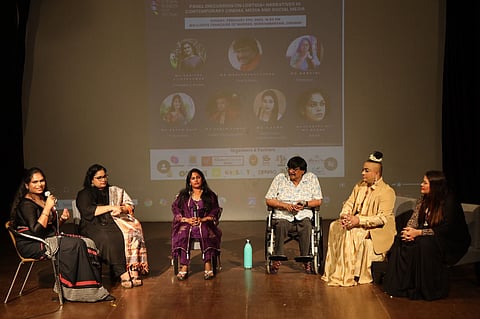

A rainbow flag stretched across the steps of the Alliance Française de Madras. But the colours didn’t stop there. Inside, on the second floor, the auditorium came alive with a spectrum of stories flickering across the screen. It was a celebration of identities, a platform for unheard voices. From February 7-9, the Chennai Rainbow Film Festival (CRFF) 2025 brought together 55 films from nearly 25 countries.
Welcoming the audience, director Sasha of CRFF said that the 2025 edition honours the beauty of diverse identities and the transformative impact of storytelling. “Our goal is to cultivate an inclusive space that uplifts marginalised voices and fosters meaningful conversations,” Sasha shared. This was followed by a classical dance performance by Rose Venkatesan and appearances from guests including Tamil Nadu MLA Mano Thangaraj and Thailand’s Consul General Racha Aribarg.
CRFF brought a rich mix of regional and global narratives. Tamil films like Moondraam Paal and Sembula explored local queer experiences, while Still Your Child and Beyond the Binary in a Sacred Land widened the lens to international perspectives. The British short film Dawn won Best International Queer Film, while Sivashakthi, directed by Pavan, took home Best Tamil Short Film. Audience favourite Oh Butterfly secured the Audience Choice Award, Society Barks won Best Documentary, Yaarum Yaavarudanum was named Best One-Minute Short Film and Neela Nira Sooriyan bagged Best Feature-Length Film.
Debating diversity
Beyond the screen, the festival became a forum for critical discussions. The first panel, ‘Beyond 377: Navigating LGBTQIA+ Rights and the Future’ moderated by activist Sharan Jayaraman, gathered legal experts, activists, and community leaders to discuss the realities after the decriminalisation of Section 377. Supreme Court lawyer Prabhakaran Ramachandran, journalist Priya Menon, Chennai Dost founder Vikranth Prasanna, Sahodaran’s general manager Jaya, and theatre artiste Srijith Sundaram shared insights on the ongoing fight for rights.
The second panel examined LGBTQIA+ narratives in contemporary cinema and media. Filmmaker and actress Vanitha Vijayakumar, poet Manushyaputhran, filmmaker Nandini, actress Rekha Nair, and fashion choreographer Karun Raman reflected on the necessity of authentic queer representation. It raised questions like — Who gets to tell queer stories? How can cinema move beyond stereotypes? And why do heterosexual actors continue to take on LGBTQIA+ roles?
Honouring heroes
The festival also recognised those shaping change. The Rainbow Ambassador Awards celebrated actress Shakeela, social media influencer Madan, and gender rights activist Diya Sana. Journalist Neelakandan, filmmaker Nandhini JS, and advocate Prabhakaran Ramachandran were also honoured for their contributions to LGBTQIA+ rights. The Lifetime Achievement Award was presented to trans activist Kiruba, whose decades of advocacy has transformed lives. “This recognition is not just for me, but for the entire community,” she said, reflecting on her journey especially with the Tamil Nadu AIDS Community initiative.
Shakeela, receiving the Rainbow Ambassador Award, spoke about her deep ties to the community. “This is my family. After losing my biological mother and feeling lost, Kirubamma stood by me and gave me a second chance at life. I have often said that award functions rarely invite me, so this recognition from my own people is truly special.” She also called for more authentic representation in films, urging filmmakers to cast LGBTQ+ actors in queer roles. Diya Sana addressed the need to challenge internalised queerphobia, “We need to overcome these fears within ourselves first. Only then can we show the world who we really are.”
Following a parai performance, the stage transformed for Muran, a thought-provoking play curated by activist Negha. With an all-queer cast, the skit unravelled the layers of everyday discrimination — how a vegetarian easily finds a home while a queer person struggles, how skin colour dictates privilege, and how trans visibility doesn’t always mean acceptance. It questioned queerphobia, the complexity of allyship, and the gaps that remain despite the 2014 NALSA judgment. As the curtains fell, it left behind a reminder of why queer stories matter. As long as there are voices to be heard, the colours will continue to shine.